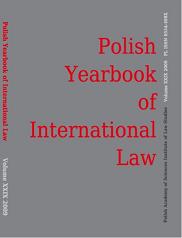Overcoming the Past by International Law
Overcoming the Past by International Law
Author(s): Roman KwiecieńSubject(s): Law, Constitution, Jurisprudence
Published by: Instytut Nauk Prawnych PAN
Keywords: international law; past; East Timor; Kosovo; Security Council; Germany
Summary/Abstract: The efficiency of international law in resolving historical problems depends on the belief of States in law as an implement for ordering their mutual relations. States’ uniformity of views concerning the past, as well as their common expectations for the future, are decisive in the formation of this belief. Common appreciation of the past is of particular significance, because international legal rules and norms are the result of historical experiences. Consequently, lack of common vision of the past is responsible in practice for the discrepancy between Sein and Sollen. As Philip Allott pointed out, international law is a bridge between our past and future. However, unless there is a common consent on history by states and nations, this bridge is fragile. As a result, rules and norms of international law are not able to overcome the toxic past of nations, as is evident in, e.g., contemporary Polish-Russian relations. What is more, lack of a common understanding of history by states and nations connected by a common past can even lead to an exacerbation of unresolved historical disputes. Recently, this has been demonstrated in the case of Kosovo, where the weakness of international law is manifested.
Journal: Polish Yearbook of International Law
- Issue Year: 2009
- Issue No: 29
- Page Range: 15-50
- Page Count: 36
- Language: English
- Content File-PDF

